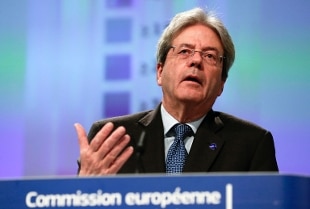- Paris-Berlin axis on the Mes light. Bei plan of 200 billion
- Coronavirus, Conte a von der Leyen: "More courage is needed"
- Gentiloni: with divergences in Europe we now risk the whole union
Share
04 April 2020 "Awareness of the need for solidarity seems to me to grow a little more every day. And that's okay. As German Chancellor Angela Merkel said, this crisis is the worst since the Second World War and there will be no winners. nor losers of the crisis in Europe. Either we face this challenge together or we will fail together. This is why solidarity is important. And this provides not only the help absolutely necessary in the care of the sick, but also economic and strategic solidarity. " To affirm it, in an interview with 'Die Welt', is the EU Commissioner for Economy, Paolo Gentiloni stressing that "if we do not find a common response to this crisis, the European project is at risk. Anti-European forces will use the crisis to their advantage and will use quite different arguments in Italy and France than in Germany or the Netherlands. That is why it is so important to find a common response to this crisis. " For Gentiloni, "European states have no future on their own. We need Europe, the common internal market, the common currency and everything we have built up in recent decades. In this crisis, we must also save the EU".Common bonds are needed, Mes light is not enough
"The Mes may be part of a solution but it is not enough. The Mes was created in a completely different situation. At that time, some countries were in serious difficulties and had lost access to the markets. Mes helped them then, with aid that was conditional and for which states had to accept monitoring programs. This is absolutely unacceptable in the current situation, since all states are affected by the crisis and have no fault. The unconditional Mes would therefore be a useful tool, but just one of many. " This was stated in an interview with 'Die Welt' by the Commissioner for Economy, Paolo Gentiloni who underlines the need for a mix of tools to face the coronavirus crisis which must include "loans from the EIB, the Mes and new proposals such as Sure ". But the attitude that says "we don't need new tools" like debt mutualisation "doesn't get us anywhere. Just look out the window! The streets are deserted and the economy is firm. This recession is not comparable to the crisis ten years ago. "
For Gentiloni, "a European economic recovery plan is needed which should be financed with the issue of bonds. These can be issued by the institutions we already have, by the EIB, by the Mes, by the EU Commission or even jointly by the EU countries. My message to Germany and other countries is clear: the issue of bonds should be a one-off measure for an exceptional circumstance. I think Germany and other Northern European countries can accept it. "
These 'coronabonds' can be decided together among European countries on the size, duration, name. "They can be called 'Recovery Bonds', for example, as suggested by France. But the message to Northern Europe is: we are not talking about mutualisation of debts but of mutualisation of common debts linked to the fight against coronavirus and its consequences".
We need a European Marshall plan for reconstruction
"We have to provide massive support for the economic recovery process. We need a European Marshall plan. The Marshall plan came two years after the end of World War II; we don't have that much time this time. We have to start the reconstruction plan during the crisis and parallel to the exit from crisis measures. We need a decision on a plan this spring, not in two years. And this must include common bonds as a source of funding. The EU budget will also play a role in this. , therefore we are reviewing our budget planning, says in an interview with 'Die Welt' is the EU Commissioner for Economy, Paolo Gentiloni.
In particular, this European Marshall plan must provide, Gentiloni underlines, "a strengthening of our health and social systems". At the same time, he adds, "we need to make the European economy more sustainable and move digitalization forward. We have all become more digital in recent weeks; we must use this momentum to accelerate digitalization."

